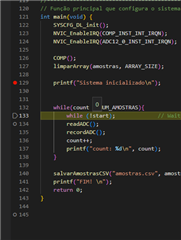Tool/software:
Hello everyone,
I am working on a project for my postgraduate studies and I've encountered an issue with part of the code. The goal is to trigger a 12-bit ADC through a comparator (COMP) using an external pin. The values captured by the ADC should be stored in an array and later sent to a CSV file.
However, I am having trouble with triggering the ADC, both via interruption and 'event'. The ADC only executes once and then the entire code stops. Below is the code I am using:
const ADC12 = scripting.addModule("/ti/driverlib/ADC12", {}, false);
const ADC121 = ADC12.addInstance();
const Board = scripting.addModule("/ti/driverlib/Board");
const COMP = scripting.addModule("/ti/driverlib/COMP", {}, false);
const COMP1 = COMP.addInstance();
const GPIO = scripting.addModule("/ti/driverlib/GPIO", {}, false);
const GPIO1 = GPIO.addInstance();
const GPIO2 = GPIO.addInstance();
const GPIO3 = GPIO.addInstance();
const GPIO4 = GPIO.addInstance();
const GPIO5 = GPIO.addInstance();
const OPA = scripting.addModule("/ti/driverlib/OPA", {}, false);
const OPA1 = OPA.addInstance();
const SYSCTL = scripting.addModule("/ti/driverlib/SYSCTL");
const VREF = scripting.addModule("/ti/driverlib/VREF");
/**
* Write custom configuration values to the imported modules.
*/
const divider9 = system.clockTree["UDIV"];
divider9.divideValue = 2;
const gate7 = system.clockTree["MFCLKGATE"];
gate7.enable = true;
const gate8 = system.clockTree["MFPCLKGATE"];
gate8.enable = true;
const multiplier2 = system.clockTree["PLL_QDIV"];
multiplier2.multiplyValue = 5;
const mux8 = system.clockTree["HSCLKMUX"];
mux8.inputSelect = "HSCLKMUX_SYSPLL0";
const oscillator2 = system.clockTree["SYSOSC"];
oscillator2.enableSYSOSCFCL = true;
ADC121.$name = "ADC12_0";
ADC121.adcMem0vref = "VREF";
ADC121.enabledInterrupts = ["DL_ADC12_INTERRUPT_MEM0_RESULT_LOADED"];
ADC121.sampleTime0 = "250 ns";
ADC121.sampleTime1 = "250 ns";
ADC121.adcMem0bcsen = true;
ADC121.sampClkSrc = "DL_ADC12_CLOCK_ULPCLK";
ADC121.adcMem0chansel = "DL_ADC12_INPUT_CHAN_13";
ADC121.enableFIFO = true;
ADC121.repeatMode = true;
ADC121.peripheral.$assign = "ADC0";
Board.InitPriority11 = "/ti/driverlib/PWM";
Board.InitPriority13 = "/ti/driverlib/QEI";
Board.InitPriority14 = "/ti/driverlib/CAPTURE";
Board.InitPriority12 = "/ti/driverlib/COMPARE";
Board.InitPriority5 = "/ti/driverlib/GPIO";
Board.InitPriority1 = "/ti/driverlib/VREF";
Board.InitPriority3 = "/ti/driverlib/COMP";
COMP1.channelEnable = ["POS"];
COMP1.vSource = "DL_COMP_REF_SOURCE_VREF_DAC";
COMP1.controlSelect = "DL_COMP_DAC_CONTROL_SW";
COMP1.enableOutputFilter = true;
COMP1.$name = "COMP";
COMP1.outputEnable = true;
COMP1.enabledInterrupts = ["DL_COMP_INTERRUPT_OUTPUT_EDGE"];
COMP1.posChannel = "DL_COMP_IPSEL_CHANNEL_1";
COMP1.interruptPriority = "0";
COMP1.peripheral.$assign = "COMP1";
COMP1.peripheral.compPinOut.$assign = "PA3";
COMP1.peripheral.compPinPos1.$assign = "PB24";
COMP1.compPinOutConfig.$name = "ti_driverlib_gpio_GPIOPinGeneric2";
COMP1.compPinPos1Config.$name = "ti_driverlib_gpio_GPIOPinGeneric3";
GPIO1.$name = "GPIO_PB6";
GPIO1.port = "PORTB";
GPIO1.portSegment = "Lower";
GPIO1.associatedPins[0].initialValue = "SET";
GPIO1.associatedPins[0].$name = "USER_PB6";
GPIO1.associatedPins[0].assignedPin = "6";
GPIO1.associatedPins[0].pin.$assign = "PB6";
GPIO2.port = "PORTB";
GPIO2.portSegment = "Lower";
GPIO2.$name = "GPIO_PB7";
GPIO2.associatedPins[0].initialValue = "SET";
GPIO2.associatedPins[0].$name = "USER_PB7";
GPIO2.associatedPins[0].assignedPin = "7";
GPIO2.associatedPins[0].pin.$assign = "PB7";
GPIO3.port = "PORTB";
GPIO3.portSegment = "Lower";
GPIO3.$name = "GPIO_PB8";
GPIO3.associatedPins[0].initialValue = "SET";
GPIO3.associatedPins[0].$name = "USER_PB8";
GPIO3.associatedPins[0].assignedPin = "8";
GPIO4.port = "PORTB";
GPIO4.$name = "GPIO_green";
GPIO4.portSegment = "Upper";
GPIO4.associatedPins[0].initialValue = "SET";
GPIO4.associatedPins[0].$name = "USER_green";
GPIO4.associatedPins[0].launchPadShortcut = "LED2GreenEn";
GPIO5.port = "PORTB";
GPIO5.portSegment = "Upper";
GPIO5.$name = "GPIO_blue";
GPIO5.associatedPins[0].initialValue = "SET";
GPIO5.associatedPins[0].$name = "USER_blue";
GPIO5.associatedPins[0].launchPadShortcut = "LED2BlueEn";
GPIO5.associatedPins[0].pin.$assign = "PB22";
OPA1.$name = "OPA_0";
OPA1.cfg0PSELChannel = "IN0_POS";
OPA1.cfg0MSELChannel = "GND";
OPA1.cfg0Chop = "ADC_AVERAGING";
OPA1.advBW = "HIGH";
OPA1.cfg0NSELChannel = "RBOT";
OPA1.advRRI = true;
OPA1.cfg0OutputPin = "ENABLED";
OPA1.peripheral.$assign = "OPA0";
OPA1.peripheral.In0PosPin.$assign = "PA26";
OPA1.peripheral.OutPin.$assign = "PA22";
OPA1.In0PosPinConfig.$name = "ti_driverlib_gpio_GPIOPinGeneric0";
OPA1.OutPinConfig.$name = "ti_driverlib_gpio_GPIOPinGeneric4";
SYSCTL.forceDefaultClkConfig = true;
SYSCTL.clockTreeEn = true;
VREF.advClockConfigEnable = true;
VREF.advClkSrc = "DL_VREF_CLOCK_BUSCLK";
VREF.checkVREFReady = true;
VREF.peripheral.$assign = "VREF";
VREF.peripheral.vrefPosPin.$assign = "PA23";
VREF.vrefPosPinConfig.$name = "ti_driverlib_gpio_GPIOPinGeneric1";
Board.peripheral.$suggestSolution = "DEBUGSS";
Board.peripheral.swclkPin.$suggestSolution = "PA20";
Board.peripheral.swdioPin.$suggestSolution = "PA19";
GPIO3.associatedPins[0].pin.$suggestSolution = "PB8";
GPIO4.associatedPins[0].pin.$suggestSolution = "PB27";
#include <stdlib.h>
#include <stdint.h>
#include <string.h>
#include <stdio.h>
#include <stdbool.h>
#include "ti/driverlib/dl_adc12.h"
#include "ti/driverlib/dl_gpio.h"
#include "ti_msp_dl_config.h"
#include "sys/_stdint.h"
#include "ti/driverlib/m0p/dl_core.h"
#define COMP_INST_REF_VOLTAGE_mV (3300)
#define COMP_INST_DAC8_OUTPUT_VOLTAGE_mV (50)
const uint16_t ADC_RESOLUTION = 12;
const uint16_t ARRAY_SIZE = 0x01 << ADC_RESOLUTION;
volatile bool gCheckADC = false;
volatile bool start = false;
volatile uint16_t gADCResult = 0;
uint8_t dacValue = 0;
uint32_t amostras[ARRAY_SIZE];
uint32_t count = 0;
uint32_t NUM_AMOSTRAS = 10000;
//-----------------------------------------------------------------------------------------------------------------------------
// Function to Save Data to CSV:
void salvarAmostrasCSV(const char *nomeArquivo, uint32_t amostras[], uint16_t numAmostras) {
// Construa o caminho absoluto
const char *caminhoAbsoluto = "C:/Users/verga/OneDrive/Desktop/ADC_resultados/julho/amostra.csv";
FILE *file = fopen(caminhoAbsoluto, "w");
if (file == NULL){
printf("Error opening the file.\n");
return;
}
printf("File opened successfully. Saving data...\n");
fprintf(file, "Valor ADC,Ocorrencias\n");
for(int i = 0; i < ARRAY_SIZE; i++){
fprintf(file, "%d,%d\n", i, amostras[i]);
}
fclose(file);
printf("Data successfully saved to CSV file.\n");
}
//-----------------------------------------------------------------------------------------------------------------------------
// Function to clear array
void limparArray(uint32_t amostras[], uint32_t tamanho) {
memset(amostras, 0, tamanho * sizeof(uint32_t));
}
//-----------------------------------------------------------------------------------------------------------------------------
// Configures the comparator and enables DAC and related interrupts
void COMP() {
dacValue = (COMP_INST_DAC8_OUTPUT_VOLTAGE_mV * 255) / COMP_INST_REF_VOLTAGE_mV; // Calculate the DAC value based on the configured voltage
DL_COMP_setDACCode0(COMP_INST, dacValue); // Configures the comparator DAC
DL_COMP_enable(COMP_INST); // Enable the comparator
DL_COMP_enableInterrupt(COMP_INST, DL_COMP_INTERRUPT_OUTPUT_EDGE); // Enable comparator interrupts
NVIC_EnableIRQ(COMP_INST_INT_IRQN); // Enable interrupt on NVIC
//printf("Comparator configured and interrupt enabled. (COMP)\n");
}
//-----------------------------------------------------------------------------------------------------------------------------
// Delay function in clock cycle
void delay_cycles(uint32_t cycles) {
while (cycles > 0) {
__asm(" nop");
cycles--;
}
}
//-----------------------------------------------------------------------------------------------------------------------------
// ADC reading function
void readADC() {
gADCResult = 0;
DL_ADC12_startConversion(ADC12_0_INST); // ADC activation
DL_GPIO_setPins((GPIOB), GPIO_PB7_USER_PB7_PIN); // oscilloscope visualization control
gADCResult = DL_ADC12_getMemResult(ADC12_0_INST, DL_ADC12_MEM_IDX_0) & 0xFFF;
}
//-----------------------------------------------------------------------------------------------------------------------------
// ADC recording function:
void recordADC() {
amostras[gADCResult]++; // Increments the occurrence of the ADC value in the array
DL_GPIO_clearPins((GPIOB), GPIO_PB7_USER_PB7_PIN); // oscilloscope visualization control
DL_GPIO_clearPins((GPIOB), GPIO_PB6_USER_PB6_PIN); // reset do opengamma
printf("ADC lido: %d\n", gADCResult);
delay_cycles(20); // delay in clock cycles
DL_GPIO_setPins((GPIOB), GPIO_PB6_USER_PB6_PIN); // reset do opengamma
start = false;
gCheckADC = false;
}
//-----------------------------------------------------------------------------------------------------------------------------
// Comparator Interrupt Handler:
void GROUP1_IRQHandler(void) {
if (DL_COMP_getPendingInterrupt(COMP_INST) == DL_COMP_IIDX_OUTPUT_EDGE) { // Checks whether the interrupt was caused by a rising edge
start = true;
DL_COMP_clearInterruptStatus(COMP_INST, DL_COMP_INTERRUPT_OUTPUT_EDGE); // Clears comparator interrupt
}
}
//-----------------------------------------------------------------------------------------------------------------------------
// Interrupt handler for the ADC
void ADC12_0_INST_IRQHandler(void) {
if (DL_ADC12_getPendingInterrupt(ADC12_0_INST) == DL_ADC12_IIDX_MEM0_RESULT_LOADED) {
gCheckADC = true;
DL_ADC12_clearInterruptStatus(ADC12_0_INST, DL_ADC12_INTERRUPT_MEM0_RESULT_LOADED); // Clears ADC interrupt
}
}
//-----------------------------------------------------------------------------------------------------------------------------
// Função principal que configura o sistema
int main(void) {
SYSCFG_DL_init();
NVIC_EnableIRQ(COMP_INST_INT_IRQN);
NVIC_EnableIRQ(ADC12_0_INST_INT_IRQN);
COMP();
limparArray(amostras, ARRAY_SIZE);
printf("Sistema inicializado\n");
while(count < NUM_AMOSTRAS){
while (!start); // Wait for the comparator to interrupt
readADC();
recordADC();
count++;
printf("count: %d\n", count);
}
salvarAmostrasCSV("amostras.csv", amostras, ARRAY_SIZE);
printf("FIM! \n");
return 0;
}
Issue Faced:
- The ADC is triggered only once and does not continue as expected.
If anyone could provide guidance or support on how to resolve this issue, I would greatly appreciate it.
Thank you in advance for your help!


 before starting
before starting before the first pass through while
before the first pass through while second passed by while
second passed by while

